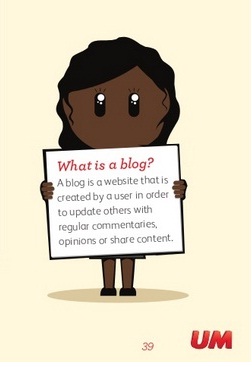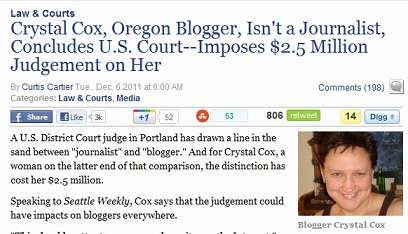
Lawyer Harry L. Roque’s analysis of the decision is more accurate: “Bloggers enjoy the same protection as journalists.”
Two weeks ago the Ninth Circuit ruled in the case of Obsidian Finance Group v. Crystal Cox that even though someone might not write for the “institutional press,” they’re entitled to all the protections the Constitution grants journalists.
Judge Andrew Hurwitz said, “the Court expressly noted that ‘we draw no distinction between the media respondents and’ a non-institutional respondent.’”
This is a reversal of December 2011 by a federal judge in Oregon, U.S. District Judge Marco Hernandez who said Cox, who styled herself as “an investigative blogger,” was not a journalist and cannot claim the protections afforded to mainstream reporters and news outlets.
The case stemmed from the online articles by Cox against Obsidian Finance Group LLC. She reportedly called Obsidian lawyer Kevin Padrick a “thug and a thief” during the handling of bankruptcy proceedings by him and Obsidian Finance Group LLC.
During the trial, she was asked to name her sources and she sought protection in the Oregon’s shield law not compelling media to produce sources.
 Hernandez said Cox cannot claim that protection because she is not a journalist. He enumerated his understanding of the attributes of a journalist which Cox did not possess: (1) any education in journalism; (2) any credentials or proof of any affiliation with any recognized news entity; (3) proof of adherence to journalistic standards such as editing, fact-checking, or disclosures of conflicts of interest; (4) keeping notes of conversations and interviews conducted; (5) mutual understanding or agreement of confidentiality between the defendant and his/her sources; (6) creation of an independent product rather than assembling writings and postings of others; or (7) contacting ‘the other side’ to get both sides of a story.”
Hernandez said Cox cannot claim that protection because she is not a journalist. He enumerated his understanding of the attributes of a journalist which Cox did not possess: (1) any education in journalism; (2) any credentials or proof of any affiliation with any recognized news entity; (3) proof of adherence to journalistic standards such as editing, fact-checking, or disclosures of conflicts of interest; (4) keeping notes of conversations and interviews conducted; (5) mutual understanding or agreement of confidentiality between the defendant and his/her sources; (6) creation of an independent product rather than assembling writings and postings of others; or (7) contacting ‘the other side’ to get both sides of a story.”
The US District Court found Cox guilty of defamation and awarded the finance company $ 2.5 in damages.
In the recent court ruling, Hurwitz said, “ The protections of the First Amendment do not turn on whether the defendant was a trained journalist, formally affiliated with traditional news entities, engaged in conflict-of-interest disclosure, went beyond just assembling others’ writings, or tried to get both sides of a story. As the Supreme Court has accurately warned, a First Amendment distinction between the institutional press and other speakers is unworkable: ‘With the advent of the Internet and the decline of print and broadcast media . . . the line between the media and others who wish to comment on political and social issues becomes far more blurred.’”
Roque, in his commentary carried by VERA Files, said the dilemma is the differing definition of who is a journalist: “For instance, the United States Congress, in a draft of a Federal shield law, defines a journalist as ‘one who works for a traditional media organization for pay or gain’, a definition adopted as well by the UNESCO. This will exclude bloggers altogether from the protection of the proposed shield law. On the hand, the Human Rights Committee in its General Comment, defines ‘it is a function shared by wide variety of actors, including professionals full time reporters and analysts, as well as bloggers and others who engage in forms of self-publications in print, on the internet, or elsewhere’”.
But, Roque said, “all these miss the point. There is protection accorded by the bill of rights not just to freedom of the press, but to freedom of expression in general. The normative values of these two freedoms are identical: to discern the truth and to facilitate “open, robust and even virulent discussion of public issues”. If both freedoms have the same normative content, why should the courts distinguish between an input to the market place of ideas coming from one who earns a living by it and one who does so anyway as a public duty?
“The US Court of Appeal’s decisions, in my view, correctly refused a distinction between institutional media and bloggers because to recognize such would also violate the equal protection clause. This is another constitutional guarantee that those similarly situated will be treated alike. Had the court limited the protection of freedom of expression to professional journalists alone, it would send the message that only professional journalists can contribute to the public debate on public issues. This is contrary to the basic tenet that freedom of expression is a human right and not just a right of journalists.
“In any case, the fact that journalists are paid and bloggers are not does not constitute a real basis for distinction. In Abrams, Holmes wrote;’the true test of truth is the power of a thought to be accepted in the market place of ideas’. Certainly, Holmes did not write that only paid journalists could contribute to this market.”
Blogging now is not limited to blogsites but also cover microblogging which includes social media – Facebook and Twitter- that have enormous following in the Philippines.
The US Court of Appeals decision should make blogging as well as social media in the Philippines more alive. Freedom is power. But as Uncle Ben told Spiderman, “With great power comes great responsibility.”
Those who want to read the Court opinion will find it below:
http://cdn.ca9.uscourts.gov/datastore/opinions/2014/01/17/12-35238.pdf
Tanks, SnV.
Crystal Cox? Handle with care.
Kumusta na kaya ang kaso ng DSWD secretary kay ella ganda na blogger. Kinasuhan dahil nagpost sa blog ng mga relief goods na nasa bodega. Sa nangyaring bagyong undoy yata iyon na binaha ang metro manila dahil sa sumpa pagpatalsik kay Marcos. Di ko na makita ang blog ni ella ganda. Ginawan ko nga iyon ng tula at nasa blog ko. Hello ella ganda. Kayo na mga tao na nasa gobyerno kung may maisulat man sa inyo na hindi maganda para sa inyo ay huwag kayong magagalit lalo kung totoo. Huwag gamitin ang impluwensya para manggipit sa ordinaryong tao. Kung wala kayong mali ay walang ibabatikos sa inyo.
The decision reiterates rulings made by the US Supreme Court. It, however, states that protections for journalists are also available to bloggers.
What is more important to me is the reiteration of a decision I cited in an earlier post, which renders even paper libel (not internet) under the Revised Penal Code as unconstitutional. Under the RPC, malice is presumed. But malice is an element of the offense, and so, it must be proven by the prosecution. To presume it, is to shift the burden of proof from the prosecution onto the defense – defense must prove that there was no malice.
Note, the official must show. Burden is on the official, not the defendant.
What happened to that case, by the way? Tinulugan na?
What happened to that case, by the way? Tinulugan na? – SnV
Which case? Ella’s? I think that was dismissed. I’m not sure though.